Related Research Articles
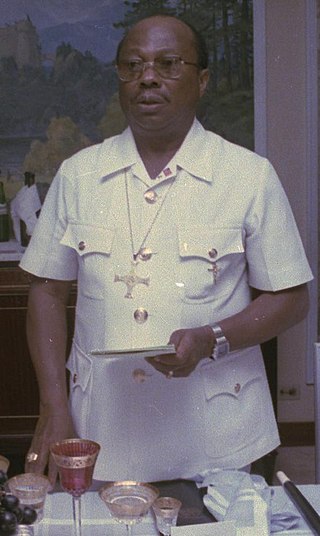
William Richard Tolbert Jr. was a Liberian politician who served as the 20th president of Liberia from 1971 until his assassination in 1980.
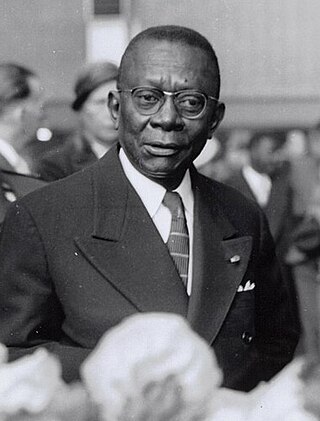
William Vacanarat Shadrach Tubman was a Liberian politician. He was the 19th president of Liberia and the longest-serving president in the country's history, serving from his election in 1944 until his death in 1971.
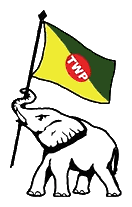
The True Whig Party (TWP), also known as the Liberian Whig Party (LWP), is the oldest political party in Liberia and Africa as a whole. Founded in 1869 by primarily darker-skinned Americo-Liberians in rural areas, its historic rival was the Republican Party. Following the decline of the latter, it dominated Liberian politics from 1878 until 1980. The nation was virtually governed as a one-party state under the TWP, although opposition parties were never outlawed.

Edward James Roye served as the fifth president of Liberia from 1870 to his overthrow in the 1871 Liberian coup d'état and subsequent death. He had previously served as the fourth Chief Justice of Liberia from 1865 until 1868. He was the first member of Liberia's True Whig Party to serve as president.

Edwin James Barclay was a Liberian politician, poet, and musician who served as the 18th president of Liberia from 1930 until 1944. He was a member of the True Whig political party, which dominated the political governance of the country for decades. Under Barclay's leadership, Liberia was an ally of the United States during World War II.

The Mano River Union (MRU) is an international association initially established between Liberia and Sierra Leone by the 3 October 1973 Mano River Declaration. It is named for the Mano River which begins in the Guinea highlands and forms a border between Liberia and Sierra Leone. On 25 October 1980, Guinea joined the union.

Winston A. Tubman is a Liberian diplomat and politician of Americo-Liberian descent. He is a former justice minister and diplomat for the nation, as well as having been the standard bearer of the Congress for Democratic Change (CDC).
William Vacanarat Shadrach Tubman Jr. is a Liberian politician and member of the Reformed United Liberia Party (RULP). He is the son of William Tubman, who was President of Liberia from 1943 to 1971, and the son-in-law of his father's successor, William R. Tolbert Jr., whose daughter Wokie he married.

The vice president of the Republic of Liberia is the second-highest executive official in Liberia, and one of only two elected executive offices along with the president. The vice president is elected on the same ticket with the president to a six-year term. In the event of the death, resignation or removal of the president, the vice president ascends to the presidency, and holds the position for the remainder of their predecessor's term. The vice president also serves as the president of the Senate and may cast a vote in the event of a tie. The current vice president is Jeremiah Koung, serving under president Joseph Boakai. He began his term on January 22, 2024.

Theophilus Ernest Eastman was a Liberian diplomat, statesman and politician. A leading member of the young and dynamic foreign policy team at the Department of State in the 1960s during the Tubman administration, he was a major architect of President Tubman's extensive involvement in Pan-African politics, serving first as Director of the Africa-Asia Bureau and then as Under-Secretary of State. In 1972, President Tolbert appointed him Ambassador to Kenya, Uganda, and Tanzania, resident in Nairobi, Kenya. He later served, from 1978 to 1983, as the second Secretary-General of the Mano River Union. From 1983 to 1986, he was the Minister of Foreign Affairs under dictator Samuel Doe, succeeding Henry Boimah Fahnbulleh and preceding John Bernard Blamo. President Charles Ghankay Taylor later appointed him to be the Minister of State for Presidential Affairs before returning him to the Foreign Ministry. He represented the National Patriotic Party at ECOWAS-sponsored peace talks in Banjul.

Clarence Lorenzo Simpson Sr. (1896–1969) was a Liberian politician who served as the 22nd vice president and the speaker of the House of Representatives. He served also as Secretary of State during much of World War II (1934–1943) under President Edwin Barclay, and later as Liberia's ambassador to the United States.

Joseph Rudolph Grimes was a Liberian statesman. A trained lawyer, he served as Secretary of State from 1960 to 1972.
The Antoinette Tubman Stadium is a multi-purpose stadium located in Monrovia, Liberia. It is used mostly for football matches although it has also been used for music concerts, major church events, political rallies and Ebola treatment. It has a capacity of 10,000 spectators and is the oldest stadium in Liberia.

General elections were held in Liberia on 11 October 2011, with a second round of the presidential election on 8 November. The presidency, as well as all seats in the House of Representatives and half of the seats in the Senate, were up for election. The election was overseen by the National Elections Commission (NEC).

Ahmadiyya is an Islamic religious movement in Liberia, founded in the year 1956, during the era of the Second Caliphate,. Approximately, up to 30,000 Ahmadi Muslims live in Liberia.
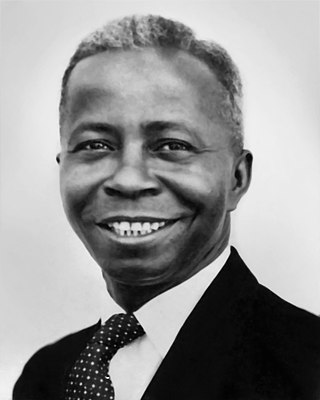
Edison Reginald Townsend was a Liberian journalist and statesman known for the establishment of Liberia's Information Services. He served as Secretary of Information and Cultural Affairs under President William Tubman, and as Minister of State for Presidential Affairs under President William Tolbert. In 1979 he was elected National Chairman of the True Whig Party. Following the 1980 Liberian coup d'état of President Tolbert on April 12, 1980, he and several other members of the Tolbert administration were put on trial and without due process executed by firing squad on April 22, 1980.

Americo-Liberian people, are a Liberian ethnic group of African American, Afro-Caribbean, and liberated African origin. Americo-Liberians trace their ancestry to free-born and formerly enslaved African Americans who emigrated in the 19th century to become the founders of the state of Liberia. They identified themselves as Americo-Liberians.

Didwho Welleh Twe was a Liberian politician. He became a representative in the Liberian legislature and a presidential candidate in the 1951 Liberian general election. A review of his life shows that he was an advocate of Liberian native rights and the first Liberian of full tribal background to officially and openly seek the Liberian presidency. Since 1847, the country was ruled by descendants of American former Black slaves known as Americo-Liberians until 1980. The descendants constitute less than ten percent of the population.
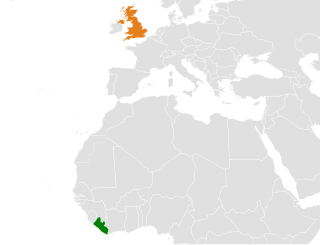
Liberia–United Kingdom relations refer to the bilateral relations between Liberia and the United Kingdom. The United Kingdom was the first country to recognize Liberian independence. Liberia has a history of border disputes with the British Colony of Sierra Leone, as well as cumbersome British loans which have at times compromised Liberian sovereignty.
Joseph Whama Boayue was a Liberian civil engineer and Secretary of Public Works from March 8, 1961, to September 5, 1962.
References
- ↑ "Sec. Caine Quits", Daily Listener 1970-02-05: 1.
- ↑ "Has Caine Resigned?" Liberian Star 1970-01-23: 1/6.
- ↑ "Dr. Augustus F. Caine, Former Secretary of Education, R.L." TLC Africa Magazine. Archived from the original on May 6, 2006.
{{cite web}}: CS1 maint: unfit URL (link)